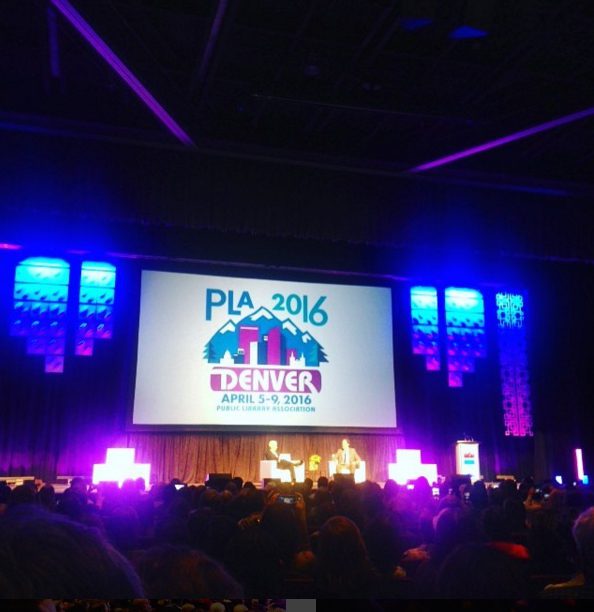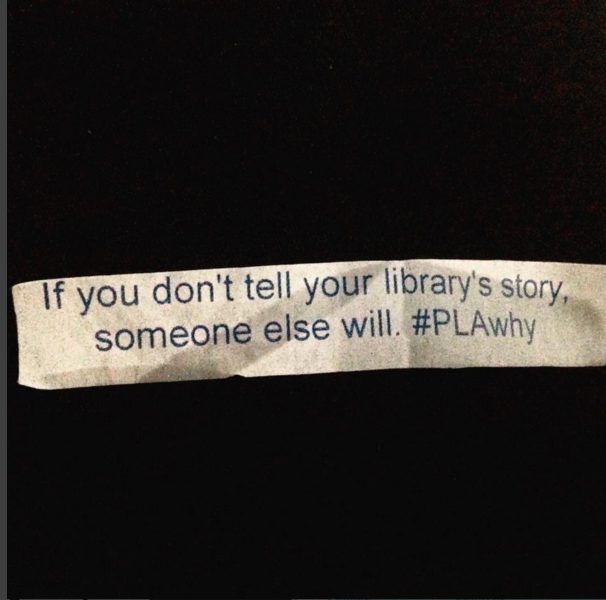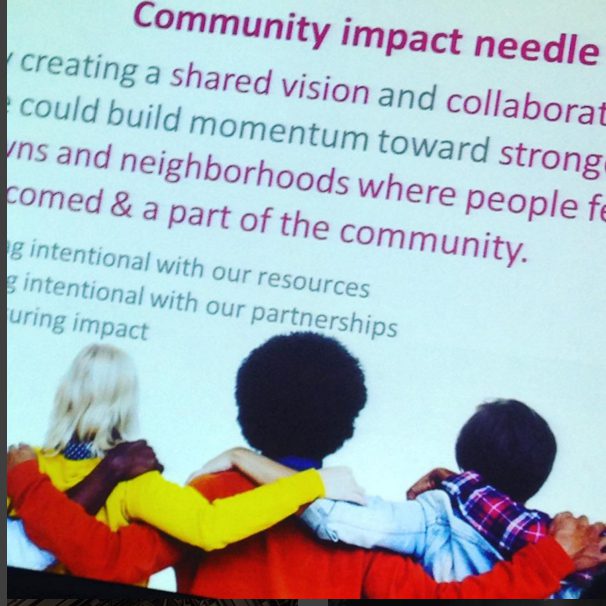 It probably won’t surprise you to know that there are professional conferences for librarians out there. There’s a conference for everything, right (http://www.pcma.org/news/news-landing/2013/09/03/the-world-s-weirdest-conferences#.VwxNSOIrKUk)? The PLA, Public Library Association, conference was in April 2016, and a litter of librarians descended upon downtown Denver (to paint a better picture, imagine thousands of well-read people wearing sensible shoes and carrying advance copies of books) in a bevy of excitement.
It probably won’t surprise you to know that there are professional conferences for librarians out there. There’s a conference for everything, right (http://www.pcma.org/news/news-landing/2013/09/03/the-world-s-weirdest-conferences#.VwxNSOIrKUk)? The PLA, Public Library Association, conference was in April 2016, and a litter of librarians descended upon downtown Denver (to paint a better picture, imagine thousands of well-read people wearing sensible shoes and carrying advance copies of books) in a bevy of excitement.
While I am not a bona fide, by-the-book librarian (I do not hold a Master of Library Science, but rather a Master of Science in Journalism), I was happy to represent one of more than 9,000 public libraries from across the United States (http://www.ala.org/tools/libfactsheets/alalibraryfactsheet01) and take back some nuggets of wisdom from other institutions.
Community Engagement
My hope for this conference was to learn more about communities and a library’s impact within. I attended, “Extraordinarily Engaged: How Three Libraries Are Transforming Their Communities,” and learned the practice of turning outward.
Turning Outward (http://www.ala.org/transforminglibraries/libraries-transforming-communities/resources-for-library-professionals): “Turning outward” is a step-by-step process developed by The Harwood Institute for Public Innovation. It entails taking steps to better understand communities; changing processes and thinking to make conversations more community-focused; being proactive to community issues; and putting community aspirations first.
 Columbus (Wisc.) Public Library, Red Hook Public Library (N.Y.), and Spokane County (Wash.) Library District shared their results of turning outward—libraries that are much larger and much smaller than your own. It was both a relief to know that many of the issues facing Laramie County Library System (changing economies, extreme dips in natural resource consumption, competition for housing/education/work, etc.) are also concerns for other libraries. Eye-opening, for sure, is the notion that what a library offers its community can often be a reflection of what the library thinks the community needs—rather than what it actually wants. Turning Outward not only allowed the aforesaid libraries to implement specific programs, but to offer more positive changes (better programs for self-enhancement, learning opportunities for children, a helping hand during city planning and crisis management, more fleshed-out collections… the list could go on).
Columbus (Wisc.) Public Library, Red Hook Public Library (N.Y.), and Spokane County (Wash.) Library District shared their results of turning outward—libraries that are much larger and much smaller than your own. It was both a relief to know that many of the issues facing Laramie County Library System (changing economies, extreme dips in natural resource consumption, competition for housing/education/work, etc.) are also concerns for other libraries. Eye-opening, for sure, is the notion that what a library offers its community can often be a reflection of what the library thinks the community needs—rather than what it actually wants. Turning Outward not only allowed the aforesaid libraries to implement specific programs, but to offer more positive changes (better programs for self-enhancement, learning opportunities for children, a helping hand during city planning and crisis management, more fleshed-out collections… the list could go on).
“It Happened In My Town: Collaboration in Crisis” was a session I attended later in the conference that proved how successful communities and libraries are when they work together for the same cause.
Aurora Public Library (CO) presented on the 2012 theater shooting; Pioneer Library System (OK) described a series of E5 tornadoes ripping through their town in 2013; and Poudre River Public Library District (CO) discussed the recent wildfires and flash flooding that devastated Northern Colorado. In each case, the library reached out to the City, State, and other public entities and asked, “How can we help?” Definitely Turning Outward—toward public entities rather than community members—but to the same effect.
Libraries in Tradition
Libraries have always been a place of education and learning, but they’ve become more accessible over the years (http://www.britannica.com/topic/library). Libraries are in schools and hospitals, on street corners and inside vehicles, are available in-person and online. They cater to a broad range of ages and cultures.
 Libraries can serve as a ground zero for communities that are on the verge of losing hope. Just read about how close Ferguson Public Library (http://ferguson.lib.mo.us/) was to the recent shooting and riots, and think about the strength the librarians showed the community by not closing their doors at all during that time. This library was named the 2015 Library of the Year for services provided to the community (http://lj.libraryjournal.com/2015/06/awards/2015-galelj-library-of-the-year-ferguson-municipal-public-library-mo-courage-in-crisis), and serves as a role model for other public libraries.
Libraries can serve as a ground zero for communities that are on the verge of losing hope. Just read about how close Ferguson Public Library (http://ferguson.lib.mo.us/) was to the recent shooting and riots, and think about the strength the librarians showed the community by not closing their doors at all during that time. This library was named the 2015 Library of the Year for services provided to the community (http://lj.libraryjournal.com/2015/06/awards/2015-galelj-library-of-the-year-ferguson-municipal-public-library-mo-courage-in-crisis), and serves as a role model for other public libraries.
Libraries are so much more than a place to get a book (and yes….we are that, too!). I walked away with ideas that I hope will make us more visible to you—our community—and ideas on how to get a conversation rolling. It’s important we ask you what you expect from your public library.
Because ideas take time to develop and implement, I hope you see changes to your library in the coming months that matter to you. And if you don’t, let us know what you want to see. Maybe we can spark a Turning Inward trend, too!
~Reese R.
